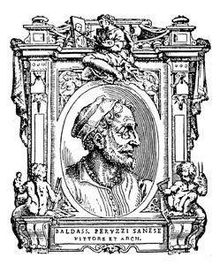Baldassare Peruzzi | |
|---|---|
 Portrait of Baldassare Peruzzi from Lives of the Most Excellent Painters, Sculptors, and Architects by Giorgio Vasari, edition of 1568. | |
| Born | Baldassare Tommaso Peruzzi 7 March 1481 |
| Died | 6 January 1536 (aged 54) |
| Nationality | Italian |
| Known for | Painting, Architecture |
| Notable work | Decoration of Villa Farnesina Palazzo Massimo alle Colonne |
| Movement | High Renaissance Mannerism |
Baldassare Tommaso Peruzzi (7 March 1481 – 6 January 1536) was an Italian architect and painter, born in a small town near Siena (in Ancaiano, frazione of Sovicille) and died in Rome. He worked for many years with Bramante, Raphael, and later Sangallo during the erection of the new St. Peter's.[1] He returned to his native Siena after the Sack of Rome (1527) where he was employed as architect to the Republic. For the Sienese he built new fortifications for the city and designed (though did not build) a remarkable dam on the Bruna River near Giuncarico. He seems to have moved back to Rome permanently by 1535. He died there the following year and was buried in the Rotunda of the Pantheon, near Raphael.[2]
He was a painter of frescoes in the Cappella San Giovanni (Chapel of St John the Baptist) in the Duomo of Siena.
His son Giovanni Sallustio was also an architect. Another son, Onorio, learned painting from his father, then became a Dominican priest in the convent of Santa Maria Sopra Minerva in Rome. He then stopped painting until requested by his superiors at San Romano di Lucca to paint the organ doors of the church.[3]
- ^ Wolfgang Lotz and Deborah Howard, Architecture In Italy 1500-1600 (New Haven, Yale Univ. Press: 1995): 1-98.
- ^ The History of Painting, Sculpture, Architecture, Graving, and of Those who have Excelled in them, Book III, by P. Monier, pages 139-141.
- ^ Memorie dei più insigni pittori, scultori e architetti Dominicani, Volume 1, by P. Vincenzo Marchese, pages 337-337.